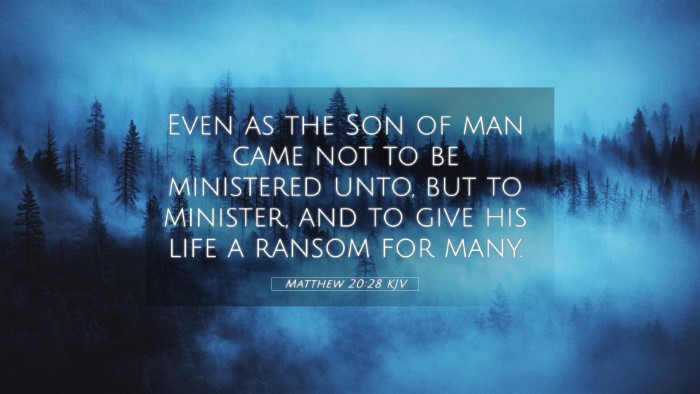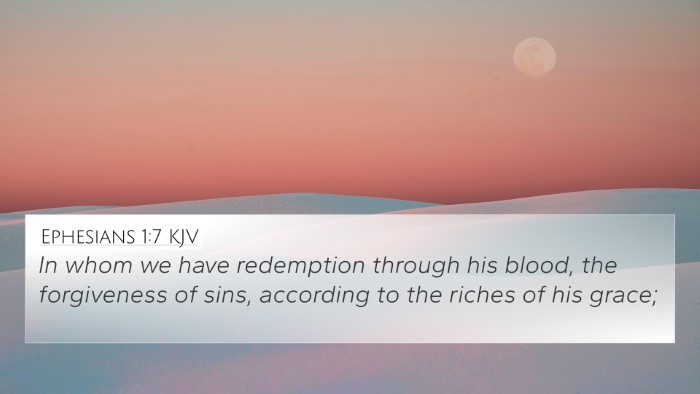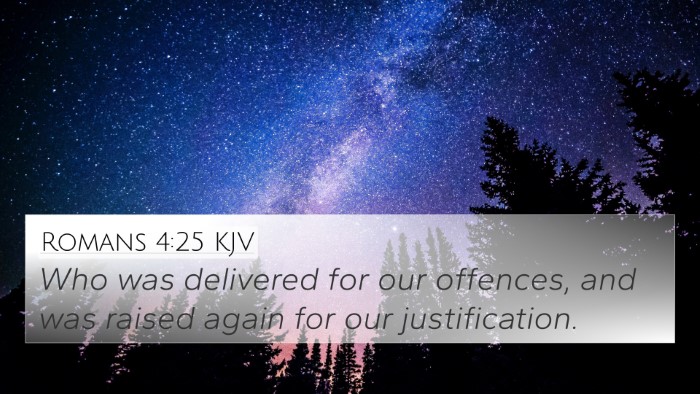Understanding Matthew 20:28
Verse: "Even as the Son of man came not to be ministered unto, but to minister, and to give his life a ransom for many."
Summary of Meaning
Matthew 20:28 encapsulates a profound truth about the nature of Christ's mission and the essence of servanthood in the Kingdom of God. The verse highlights key themes such as the contrast between earthly power and divine service, the sacrificial love of Jesus, and His role as a redeemer.
Insights from Public Domain Commentaries
The following insights stem from the works of renowned biblical commentators.
Matthew Henry's Commentary
Matthew Henry emphasizes that this verse portrays the humility and purpose of Christ's coming to earth. Unlike earthly leaders who seek to be served, Jesus modeled true leadership through servant-heartedness. He highlights the significance of Jesus's mission to 'minister,' presenting an anti-establishment view counter to social norms of authority. Moreover, the theme of Jesus giving His life as a 'ransom for many' underscores the doctrine of atonement and substitution, where His life was given for the redemption of sinners.
Albert Barnes' Notes on the Bible
Albert Barnes provides insight into the Greek terms used in the verse, particularly the word 'ransom' (λυτρον), which denotes a price paid for freedom, elaborate meaning that ties Jesus's sacrifice to the redemption of humanity from sin. Barnes posits that Jesus’s role as a ministering Savior serves to teach His followers about sacrificial love and service toward others, thus setting an example for Christian conduct. He also draws connections to the prophetic fulfilment of Jesus as depicted in Isaiah, illustrating the expectation of suffering servant themes in the Old Testament.
Adam Clarke's Commentary
Adam Clarke focuses on the implications of Jesus being a 'Son of man.' He notes that this analogy highlights both Jesus’s deity and humanity, portraying Him as accessible and relatable. Clarke discusses the idea of 'ministering' as a way for believers to emulate Christ’s actions by serving and uplifting others rather than pursuing self-interest. Furthermore, he affirms that Jesus's decisions to serve and sacrifice were deliberate, illustrating the deeper theological implications of God’s plan for salvation.
Key Biblical Cross-References
- Mark 10:45 - Similar statement regarding Jesus’s mission to serve.
- John 13:13-15 - Jesus washing the disciples’ feet as an example of humble service.
- Isaiah 53:5 - The prophecy authenticating Jesus’s suffering for our transgressions.
- 1 Timothy 2:6 - Affirms the idea of Christ giving Himself as a ransom.
- Luke 22:27 - Jesus's teaching on being the greatest through serving.
- Philippians 2:7-8 - Jesus taking the form of a servant; humility in purpose.
- Romans 5:8 - God showing His love through Christ’s sacrifice.
Thematic Connections
Matthew 20:28 connects thematically with various other scriptures that reflect Jesus' servanthood and sacrifice:
- The Servant Leadership Principle: 1 Peter 5:2-3 emphasizes shepherding God's flock with humility.
- Importance of Sacrifice: Hebrews 9:28 teaches that Christ was offered once to bear the sins of many.
- Redemption Themes: Revelation 5:9 speaks of those redeemed by the blood of the Lamb.
Conclusion
Matthew 20:28 serves as a cornerstone for understanding the nature of Jesus's mission and the attributes of genuine leadership within the Christian community. Through His example of service and sacrifice, Jesus sets a paradigm for all believers. The cross-references elucidate inter-Biblical dialogues that connect themes of redemption, servanthood, and the call to follow Christ’s example in daily life, aligning closely with the foundational principles in Christian faith.
Tools for Further Study
If you're looking to dive deeper into the connections made within Matthew 20:28 and beyond, consider exploring the following:
- Bible concordance for identifying key terms and themes across scriptures.
- Bible cross-reference guide for systematic study of related verses.
- Cross-reference Bible study methods to enhance understanding of scriptural intricacies.


























